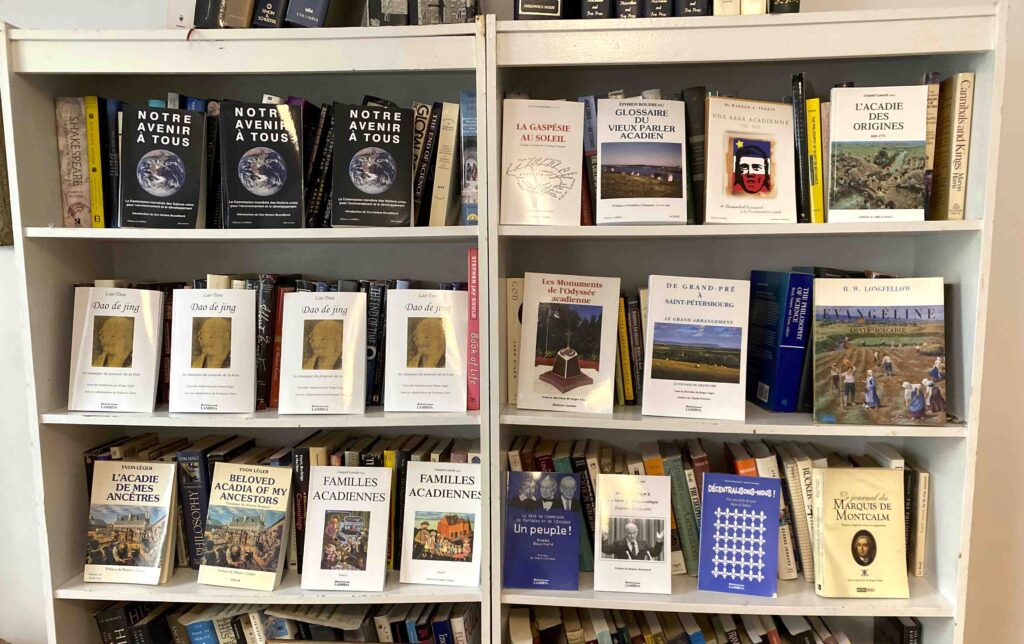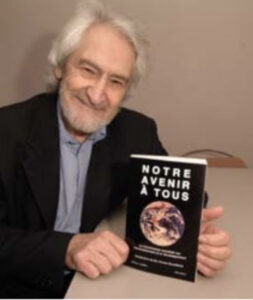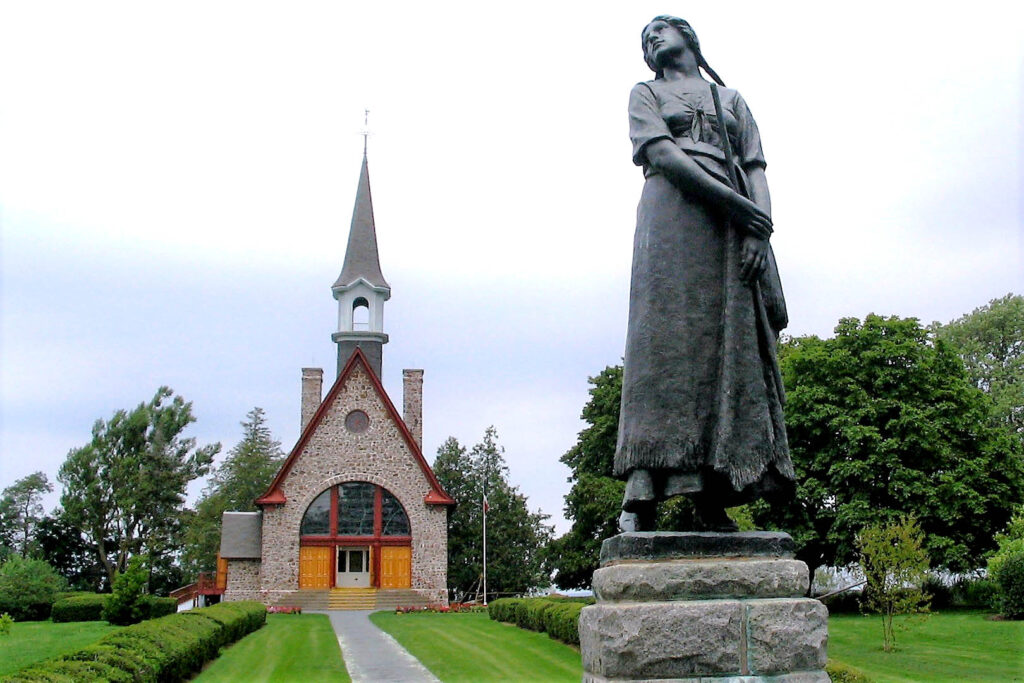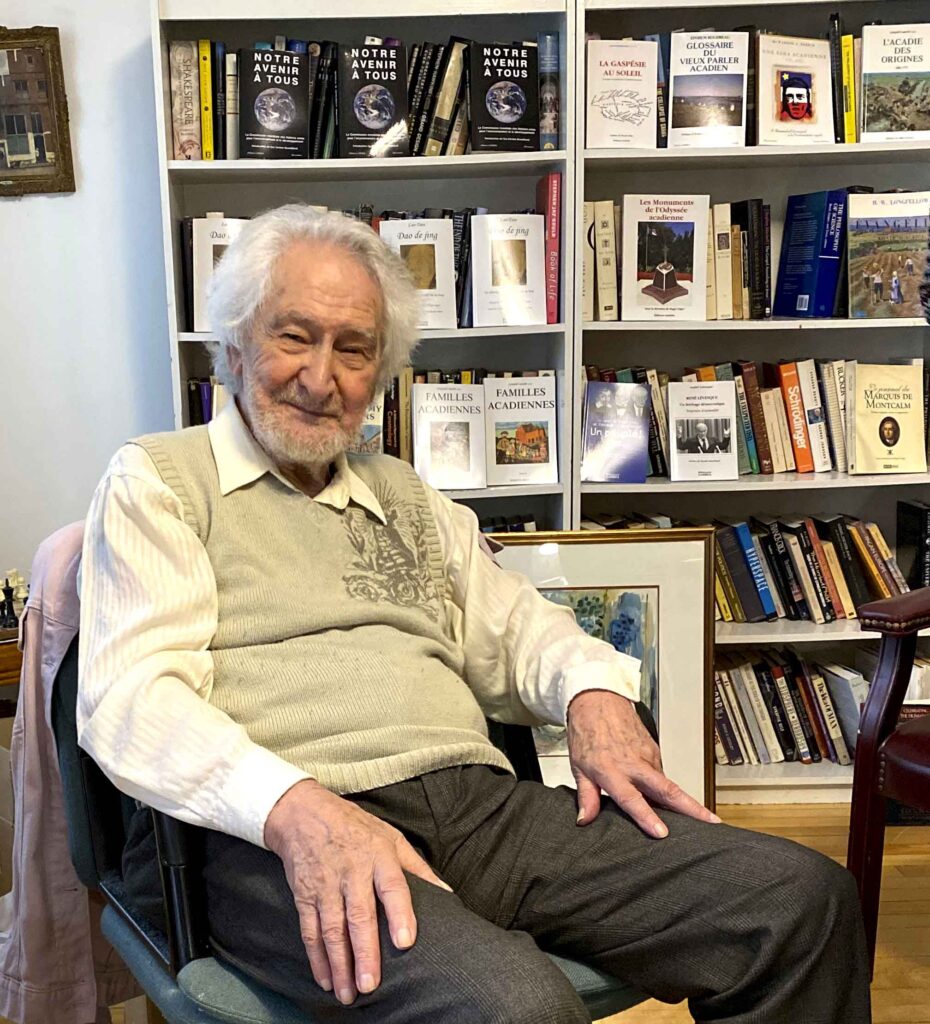Dates: 1928-
Role in AFLCR: Board of directors, 1998 to 2008; organized Rencontres internationales
Roger Léger was born in 1928 in New Brunswick. He studied philosophy at St. Paul Seminary (later University) in Ottawa, but in the fall of 1953, he left the seminary, concluding that the concept of a deity was inconsistent and irrational. Still, life on secular terms did not preclude humanitarianism or social activism: in 1957, living in Hull (Gatineau), across the river from Ottawa, Roger founded the local chapter of Abbé Pierre’s Emmaüs, an organization dedicated to helping poor and homeless people and refugees.
In 1958 he founded the Ottawa-Hull chapter of Les Amis du Devoir, or supporters of Le Devoir, a French-language newspaper in Montreal that is financially independent but depends for support on donations from “ses amies.” Roger also took up the cause of Québec nationalism. In 1959-60, still in Hull, he helped initiate Rassemblement pour l’indépendance nationale, the RIN, which supported Québec independence from Canada.
In 1972-73, he produced Tam ti delam, a television series for Télé-Québec on the history of Québec, consisting of 13 one-hour episodes. The following year he and the historian Rosario Bilodeau co-edited the book Classes sociales et pouvoir politique au Québec: Perspective historique (Montreal: Leméac, 1974), based on several of those episodes.
In 1975 he published “Le parti québécois et l’option indépendantiste,” Le Devoir. In 1976, he moved to Saint-Jean-sur-Richelieu to teach philosophy at the Collège militaire royal de Saint-Jean.
In 1983 he co-founded (with Jacques Lazure and the Québec separatist Pierre Vallières) the magazine Idées et pratiques alternatives, which he edited until 1986. Three years later, he co-edited (with André Joyal) an anthology of articles collected from the journal; the book was published under the title Alternatives d’ici et d’ailleurs (Montreal: Éditions du Fleuve, 1989).
In 1986 he retired from teaching at the military college but continued to live in Saint-Jean-sur-Richelieu. In 1987 Brundtland Report of the UN World Commission on Sustainable Development, Our Common Future, appeared; Roger issued the French translation under the title Notre avenir à tous : La commission mondiale sur l’environnement et le développement. In 2005 and 2014 he would reissue it from his small press, Éditions Lambda.
Acadians
After he retired from teaching, Roger took up the cause of the Acadian people, descendants of seventeenth-century French settlers.
In 1605 French colonists settled Acadia, an area in today’s Nova Scotia that was blessed with rich farmland. For the next 150 years these Acadians developed a distinctive culture, mostly as peaceful farmers. In 1754 Britain and France went to war (in the Seven Years’ War, also known as the French and Indian War). As part of a military campaign, the British attacked the francophone Acadians, burned their houses, and expelled them, deporting them to other British North American colonies. Then they resettled anglophones loyal to Britain on the former Acadian lands.
Francophone Acadians referred to this forced removal, which lasted from 1755 to 1763, as Le Grand Dérangement. By the time the deportations ended, more than 11,000 Acadians were displaced and 5,000 had died of disease, starvation, or shipwreck. For the next 60 years, the survivors scattered, finding new homes in seaports along the Atlantic Ocean and the Gulf of Mexico, as well as in the province of Québec. Many settled in Louisiana.
If the rest of the world ignored this crime against humanity and even forgot it, the Acadians did not. In their new locales, they preserved their language and culture as best they could. Louisiana’s Acadian settlers were progenitors of today’s Cajun people with their distinctive culture. (The French word Acadien evolved into the word Cadien, which was later anglicized as Cajun.)
Acadian Publishing
In 1987 Roger Léger, who is of Acadian descent, founded the Fédération acadienne du Québec, to promote awareness of Acadia and Acadian people living in his home province. He sought to have Acadians recognized as a second nation, after the Amerindians. He hoped the federation would be a liaison and a support to Francophone communities throughout the world. Roger was its first president, serving from 1987 to 1989.
Roger formed a connection with another Acadian descendant and advocate, the Louisiana attorney Warren Perrin who, starting in 1990, led a campaign to pressure Queen Elizabeth II to apologize for Le Grande Dérangement. As a result of this campaign, in 2003 the queen issued a royal proclamation decreeing July 28 as the annual Day of Commemoration of the Acadian Deportation.
In 2002 Roger established his small press Éditions Lambda, naming it after the Greek letter that is also a word for Einstein’s cosmological constant. Since 1998 the cosmological constant been associated with the notion that the expansion of the universe is accelerating. As the principal figure at Lambda, Roger proceeded to publish books in French by and about Acadians.

In 2005 Warren Perrin published the book Acadian Redemption: From Beausoleil Brossard to the Queen’s Royal Proclamation, the biography of an 18th-century deported Acadian who led 193 Acadians to Louisiana. Roger (with Guy Thériault) translated the book into French, under the title Une Saga acadienne, and Éditions Lambda published it in 2009.
In 2011 Roger and Éditions Lambda published Agenda historique acadien: 1604–1755, a selection of period writings from Acadian history. It was updated in several later editions.
In 2014 Roger contributed an article to Acadie Then and Now: A People’s History (L’Acadie hier et aujourd’hui: l’histoire d’un peuple, a collection of 55 essays compiled and edited by Warren Perrin and colleagues. The essays chronicle the historical and contemporary realities of Acadian and Cajun people worldwide.
In 2018 Lambda published a new edition of La Gaspésie au soleil, a 1925 book by the forgotten Acadian historian Brother Antoine Bernard.
Next Roger collaborated with La Société nationale de l’Acadie, la Commission internationale de l’Odyssée acadienne et ses partenaires en region, to publish Les monuments de l’Odyssée acadienne, a portrait of sixteen monuments erected to commemorate the deportation of the Acadians. The monuments were erected in places where they settled. The book was published by Éditions Lambda in 2020.
In 2021 Éditions Lambda published De Grand-Pré à Saint-Pétersbourg, le grand arrangement. Grand-Pré is a place in eastern Nova Scotia were Acadians once lived.
Civic Activities in Saint-Jean
In 1982 in Saint-Jean, Roger founded the youth center Maison des jeunes le Dôme, to promote the development of young people into active and responsible citizens.
In January 1999 he established the Alliance du Haut-Richelieu, dedicated to promoting the merger of the five municipalities of Saint-Jean-sur-Richelieu, a merger that materialized in 2002.
In 2002 he launched ARTO, a cultural and artistic cooperative that promotes the visual arts, crafts, music, and verbal expression and offers exhibitions, performances, film screenings, readings, and artistic workshops.
Léger is a member of the Association humaniste du Québec, La voix des humanistes athées et agnostiques (Humanist Association of Quebec, the Voice of Humanists, Atheists, and Agnostics), founded in 2005. He has served on its board of directors.
In 2022 Roger and Éditions Lambda published a French translation of Lao-zi’s Dao de jing, subtitled Le classique de la voie et de sa vertu. The text was written in China around 300 B.C. and is the seminal work of Daoism.
AFLCR
Roger was an active board member of the AFLCR from its inception in 1998. Above all, his contribution was to find ways to build friendly cross-border connections between Saint-Jean and residents of Vermont and northern New York. Every year Roger invited his AFLCR friends up to Saint-Jean and southern Quebec for diverse events. Roger’s enthusiasm for such connections was a strong motivation for the board’s choice, in 2002, to use “Lake Champlain Region” in the AFLCR’s name.
In 2019 he worked with Mélanie Dufresne, a city councilor in Saint-Jean, and AFLCR member Stan Bradeen to establish Rencontres francophones. Held in Saint-Jean and St. Albans, Vermont, these dinnertime gatherings hosted several dozen Francophones and Francophiles from the Lake Champlain Region.
Sources:
Claude Braun, “Rencontrez notre camarade Roger Léger,” Association Humaniste du Québec, April 2, 2014.
“Collection Acadie, par les Éditions lambda,” Acadian.org, n.d.
Roger Léger, interview by Janet Biehl, November 6, 2022.
The photo of Roger with Notre Avenir is from the Humanist Association website.
—Janet Biehl



